Description: War Thunder is a next generation military MMO game dedicated to...

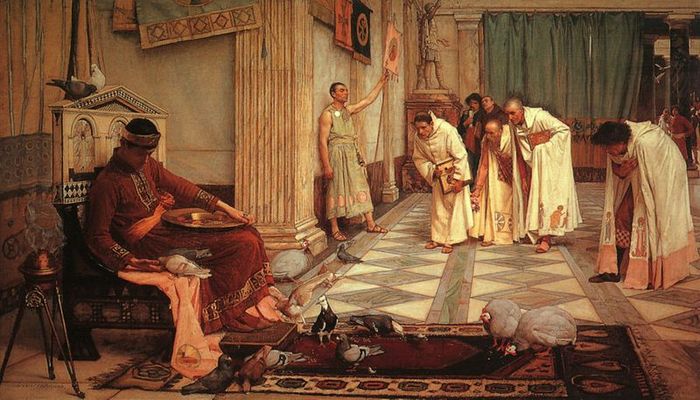
The birthplace of the Olympic Games is Ancient Greece,
fisticuffs, horseback riding,pankration chariot racing.
Run
pankration
Discus throw  chariot racing
chariot racing


Pierre de Coubertin was created

Olympic emblem
Olympic motto
Olympic medals.
Mascot
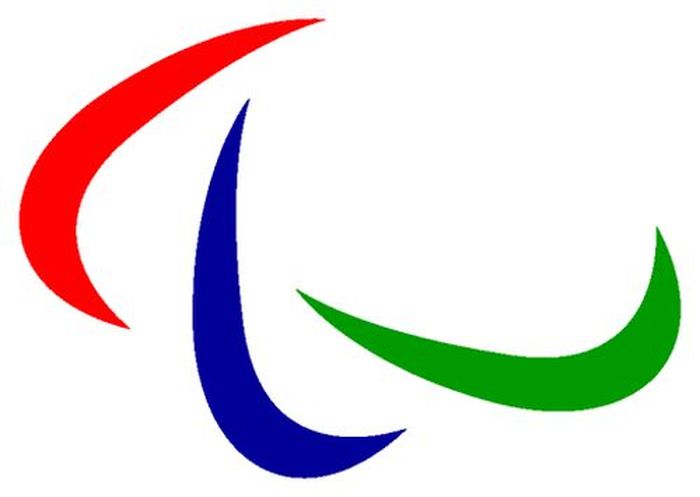
Bibliography:

Location:

Location:
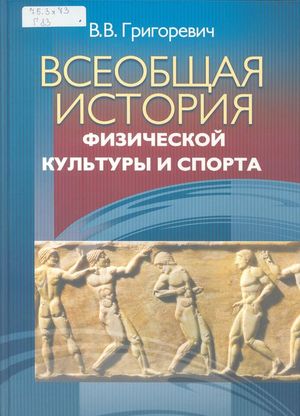
Location:
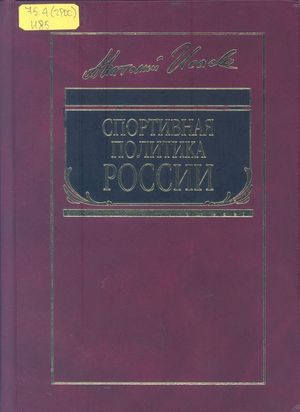
Location: hall of technology, sports and agriculture of the Central City Hospital. A.S. Pushkin.

Location:
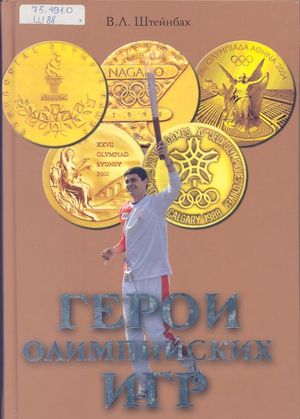
Location:
ELECTRONIC EDITIONS:
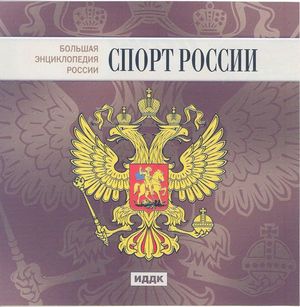
Location:
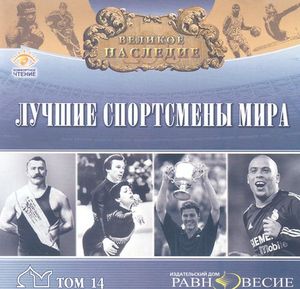
Location:
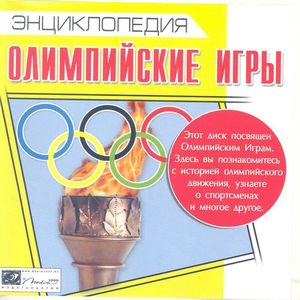
Location: hall of technology, sports and agriculture of the Central City Hospital. A.S. Pushkin.

Location:
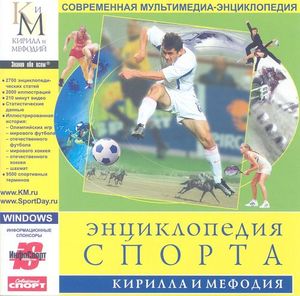
Location:
Olympic Games: from antiquity to modernity
Rivalry was the passion of the ancients. They were ready to compete always and in any place, be it a war, a theater, a philosophical dispute with a neighbor. The works of art of the Hellenes (ancient Greeks) sought to make such that no others could compare with them. This striving for perfection led to the birth of a way of life called kalokagatiya - the principle of a beautiful and kind citizen, the ideal that the ancient Greeks aspired to, which served as the basis for the emergence of a world sports holiday - the Olympic Games.
Olympic Games...them amazing story not one century attracts attention, as ordinary people, and poets, writers, historians.
The birthplace of the Olympic Games is Ancient Greece, the city of Olympia. The name of the games comes from Olympia. Their ancestors are gods, kings, rulers and heroes. The games began in 776 BC. and were held every four years in honor of the god Zeus. In the year of the games, messengers passed through Greece and its colonies, announcing the day the games began and inviting people to attend. Thus, athletes (sportsmen) and spectators gathered in Olympia from all over the Balkan Peninsula. Only free-born Greeks could participate in the Olympic Games. Slaves and people of non-Greek origin, as well as women, were not allowed to the games (women were not even allowed to attend them as spectators).
Initially, the entire competition program fit into one day. But gradually, as the Games became more and more important in the life of Ancient Greece, the competition began to last five days. In the temples, before the opening of the Games, all participants took the Olympic oath: “I prepared honestly and hard, and I will honestly compete with my rivals!” The program of the Games was interesting and varied. Athletes competed in the most various types sports. The Games included competitions in fisticuffs, horseback riding,pankration(fight without rules). In addition, arranged chariot racing.
The most difficult and at the same time the most popular was the pentathlon - pentathlon. It included running, long jump, javelin and discus throwing, wrestling. All these sports were held on the same day in a certain order, starting with jumping. It is not known exactly how the winner in the pentathlon was determined. According to one of the historians, the athletes were divided into pairs and competed with each other. The athlete who defeated the opponent in three types of competitions was considered the winner. Then the winners competed among themselves until the final pair remained.
Run was the oldest sport. The track of the stadium was 192 meters long and was made of clay sprinkled with sand. There were three main races: stages (one length of the treadmill), dialos (two lengths) and dolichos (20 or 24 segments).
There were three types of freestyle wrestling. Stand up wrestling: to win, the athlete needs to throw his opponent to the ground three times. Fight on the ground: the competition continued until one of the athletes gave up. The third kind, pankration, was the most dangerous, as any tactic was allowed during combat, except for biting and eye gouging. There were no weight categories (only division into age groups), no time limit for the fight. The referee, however, was present at the fights. His task was to prevent the death of the duel or serious injury. For greater persuasiveness, he was armed with a stick.
Discus throw. Discus throwers, as the participants in this ancient sport were called, lined up one after another, took a heavy bronze disc in their hand, rotated it several times with their hand and launched it into the air. A related sport for discus throwing was javelin throwing, which not only had to be thrown as far forward as possible, but also to hit a specific target.  The last day of the games was devoted to chariot racing, drawn by two or four horses. The distance consisted of 12 circles around the posts. At the start, the chariots were released from special starting gates. Up to 40 chariots took part in one race, so collisions were inevitable. Often these competitions, which require great strength and dexterity, ended in accidents.
The last day of the games was devoted to chariot racing, drawn by two or four horses. The distance consisted of 12 circles around the posts. At the start, the chariots were released from special starting gates. Up to 40 chariots took part in one race, so collisions were inevitable. Often these competitions, which require great strength and dexterity, ended in accidents.
The name of the winner of the Olympic Games - olympionics, the name of his father, was solemnly announced and carved on marble slabs exhibited in Olympia for public viewing. Immortal glory awaited them, not only in their hometown, but throughout the Greek world. The Olympic hero entered his native city in a chariot, dressed in a purple cape, topped with a wreath. Moreover, he entered not through an ordinary gate, but through a hole in the wall, which was sealed up on the same day so that the Olympic victory would enter the city and never leave it.
The Olympic Games were held continuously for 1169 years 292 times. In 394 AD Roman emperor Theodosius I issued a decree restricting some pagan rituals in the territory of the Empire. This was the reason for the closure of the Olympic Games.
After that, they became interested in the Ancient Games only when the excavations of Olympia began. The finds, one more surprising than the other, amazed! Increasingly, voices began to be heard for the revival of the great competitions.

 But the matter is very complicated. Considerable funds are needed, and uniform rules are needed that would suit everyone. The main thing is that a person was needed who would put his life on it. And such a person was found. The modern Olympic Games owe their revival to the French public figure, teacher, historian, Baron Pierre de Coubertin.
But the matter is very complicated. Considerable funds are needed, and uniform rules are needed that would suit everyone. The main thing is that a person was needed who would put his life on it. And such a person was found. The modern Olympic Games owe their revival to the French public figure, teacher, historian, Baron Pierre de Coubertin.
Do not think that the idea of Coubertin immediately captivated the entire sports world. She had more than enough doubters and opponents. There were even more athletes and sports figures who said that in general the Olympic Games are a good thing, but to do it yourself good deed didn't want to. Coubertin traveled to many countries of the world, argued, convinced, argued, wrote hundreds of letters to various sports organizations. And on June 23, 1894, at the Congress in Paris Pierre de Coubertin The International Olympic Committee (IOC) was created international organization, created to revive the Olympic Games and promote the Olympic movement. International Olympic Day is celebrated on June 23 every year. The International Olympic Committee chooses the venue for the Olympics.
The first modern Games were held with great success, lasted 12 days from April 6 to April 15, 1896 in Athens and became the largest international event ... Despite the fact that only 241 athletes from 14 countries took part in the Games, since ancient Greece it has been the first event of this magnitude.
 The traditional attributes of the Olympic Games are the Olympic emblem, the Olympic flame, the Olympic oath, the flag, the talisman. Traditional moments include the opening and closing ceremonies of the Olympic Games, the awarding of winners.
The traditional attributes of the Olympic Games are the Olympic emblem, the Olympic flame, the Olympic oath, the flag, the talisman. Traditional moments include the opening and closing ceremonies of the Olympic Games, the awarding of winners.
Olympic emblem- the symbol of the Olympics - five fastened rings, which symbolize the unification of the five parts of the world. Blue - Europe, black - Africa, red - America, yellow - Asia, green - Australia. The flag of any state has at least one color represented on the Olympic rings.
Also, these rings are displayed on the flag, which has been hoisted at all the Games since 1920 - a white panel, in the center of which five interlaced rings are depicted. The Olympic flag is hoisted at the solemn opening ceremony of the Olympic Games and flutters on the central mast of the Olympic stadium until the closing of the games.
Olympic motto consists of three Latin words - Citius, Altius, Fortius. (Citius, Altius, Fortius). Literally, it means "faster, higher, stronger."
In memory of the ancient Olympics, a torch relay race starts in the Greek city of Olympia a few days before the opening of the next Games.
The Olympic flame is lit on the territory of the ruins of the temple of the goddess Hera. Girls dressed in ancient Greek chitons light the Olympic torch from the rays of the sun. Kneeling down, the young man takes this torch. The sacred fire of the torch, lit at the altar of the Ancient Olympias, symbolizes the peace and friendship of all peoples.
The fire on the torch is passed from athlete to athlete during a multi-day symbolic relay race that takes place across all five inhabited continents of the Earth. The fire has a long way to go. It will pass many times from one hand to another, it will cross many countries without fading, on ships, trains and planes, before it reaches the stadium intended for the Olympic Games. The fire arrives at the venue of the Olympic Games on their opening day. The finalist of the relay torch ignites the flame of the Olympic bonfire. This symbolizes the beginning of the games. At the end of all competitions, the Olympic flame of the bonfire is extinguished, which symbolizes the closing of the games.
At the opening ceremony, one of the outstanding athletes of the country - the organizer of the Olympic Games rises to the podium and pronounces an oath: The text of the oath was proposed by Pierre de Coubertin, later it changed somewhat and now it sounds like this: these Olympic Games, respecting and observing the rules under which they are held, in a truly sporting spirit, for the glory of sport and the honor of our teams. The same oath is pronounced by the judges of the Olympic Games.
Olympic medals. Olympic medals: gold, silver and bronze are awarded to three athletes who have shown best results in competition. The winner receives a gold medal (actually, this medal is silver, but covered with a relatively thick layer of gold). Second place is awarded a silver medal, third place a bronze medal. The medals are presented at a special ceremony after the competition. The winners are placed on the podium in accordance with the places won. The national anthem of the country whose representative is the owner of the gold medal is played.
Also, each Olympic Games has its own mascot and emblem.
Mascot is a symbol of games that brings good luck. It can be cute little animals or fabulous creatures.
Each Olympic Games also has its own unique emblem, symbolizing the host city and country.
Winter and Summer Olympic Games
The Summer Olympic Games have been held every four years since 1896, with the exception of the years during World Wars. The program of the Summer Olympic Games includes summer sports such as tennis, Athletics, swimming, football, equestrian sports and many others.
The Winter Olympic Games (White Olympics) are world competitions in winter sports. First Winter Olympic Games took place in 1924. Initially, they were held in the same year as the summer ones. However, since 1994, the timing of the Winter Olympics has been shifted by two years from that of summer games. For example, this year London hosted the Summer Olympic Games, and 2 years later in 2014. To date, the program of the Winter Olympic Games has significantly expanded, the number of participants has increased, among which there are many athletes from southern countries. At first on winter olympics the Scandinavians dominated, but over time, athletes from other regions were among the favorites of the Winter Olympic Games.
There are significantly fewer winter Olympic sports than summer ones. Therefore, the duration of the winter games is no more than 10 days, and the summer games are no more than 15.
 The Paralympic Games are the culmination of four years of waiting and training for Paralympic athletes and other members of the Paralympic movement. The Paralympic Games are the most prestigious competition for people with disabilities, the selection for which takes place within the framework of national and world sports competitions. The symbols of the Paralympic Games are three open colored half rings.
The Paralympic Games are the culmination of four years of waiting and training for Paralympic athletes and other members of the Paralympic movement. The Paralympic Games are the most prestigious competition for people with disabilities, the selection for which takes place within the framework of national and world sports competitions. The symbols of the Paralympic Games are three open colored half rings.
The International Olympic Committee and the International Paralympic Committee signed a Cooperation Agreement in 2002. This agreement laid down the principles of relations between the two organizations. And a year later, the practice of “one application - one city” was introduced: the city that applied to host the Olympic Games automatically submits an application to host the Paralympic Games, which will be held at the same sports venues and facilities. The timing of the Paralympic competitions has been moved two weeks after the end of the Olympic Games.
The official name of the Paralympic Games was approved in 1988. winter games in Innsbruck (Austria). Prior to this, the Games were called "Stoke Mandeville" (in honor of the place where the first Paralympic competitions were held).
In the modern sense, the name "Paralympic Games" has been reinterpreted as "near, outside the Olympics": a fusion of the Greek preposition "Para" (beside) and the word "Olympics". Such an interpretation testifies to the holding of competitions among people with disabilities in parallel and on an equal footing with the Olympic Games.
The very idea of creating the Paralympic Games belongs to the neurosurgeon Ludwig Guttmann (July 3, 1899 - March 18, 1980). On behalf of the British government in 1944, he opened the Spinal Cord Injury Center at the Stoke Mandeville Hospital in Aylesbury. And in July 1948, Guttmann hosted the first games for people with musculoskeletal injuries and called them the National Stoke Mandeville Games for the Disabled. By coincidence, they began on the same day as the 1948 Olympic Games in London. The Stoke Mandeville Games were attended by former military personnel who were injured in the war. Soon the Stoke Mandeville Games were given international status. It happened in 1952, when former Dutch soldiers took part in them.
The USSR national team took part in the Paralympic Winter Games in 1984 in Innsbruck, Austria. Since we did not have much experience in such competitions, the team had only two bronze medals, won by skier Olga Grigoryeva, a visually impaired skier. In the Summer Paralympic Games, our Paralympians performed for the first time in 1988 in Seoul ( South Korea). This time, our team proved to be more than worthy, having won 55 medals, 21 of which were gold. Today, the Russian Paralympic team is one of the strongest world teams, led by our fellow countryman living in Surgut - Alexei Vitalyevich Ashapatov, Russian athlete, champion and record holder of the 2008 and 2012 Summer Paralympic Games, world champion (2006), European champion (2005), ten-time champion of Russia in athletics.
Bibliography:
 Bazunov, B. A. Idols of the stadiums of Hellas[Text]: a story about the birth, flourishing and death of the Olympic, Pythian, Isthmian, Nemean, Panathenaic games of antiquity / Boris Bazunov. - M.: Council. sport, 2004. - 370, p.: ill.
Bazunov, B. A. Idols of the stadiums of Hellas[Text]: a story about the birth, flourishing and death of the Olympic, Pythian, Isthmian, Nemean, Panathenaic games of antiquity / Boris Bazunov. - M.: Council. sport, 2004. - 370, p.: ill.
The book is popular and almost exhaustive - with the involvement of documents, evidence of historians and literary sources - the history of the Olympic and other pan-Hellenic games is presented. For the first time, the reader is presented with biographies of outstanding ancient Olympionists, as well as a list of winners of ancient Olympiads, which was not previously published in Russian. Also, for the first time, the author refuted the myths about the Olympic victories of the great thinkers Pythagoras and Plato, the great commander Alexander the Great. An essay on the Panathenaic Games is unprecedented for Russian historiography. The book presents a great small people who created a unique cult of physical education and such a phenomenon as the Olympic Games.
Location: hall of technology, sports and agriculture of the Central City Hospital. A.S. Pushkin, central children's library, city libraries No. 2,3, 4, 5, 15, 21, 25.
 Bochinin, A. N. 100 moments of sport[Text]: [photo album] / Anatoly Bochinin; [comp. E. A. Malkov]. - M.: Council. sport, 2007. - 95, p. : ill., tsv. ill.
Bochinin, A. N. 100 moments of sport[Text]: [photo album] / Anatoly Bochinin; [comp. E. A. Malkov]. - M.: Council. sport, 2007. - 95, p. : ill., tsv. ill.
The works of the famous sports photographer Anatoly Bochinin are presented. He captured glorious moments from the history of Soviet sports: football, hockey, gymnastics, athletics, figure skating, the 1980 Olympics... There are 100 color and black-and-white photographs in the album.
Location: hall of technology, sports and agriculture of the Central City Hospital. A.S. Pushkin.
 Grigorevich, V. V. General history physical culture and sports[Text]: textbook. allowance for education. institutions of higher prof. education, carrying out education. activity in the direction 032100 - Physical culture / VV Grigorevich. - M.: Council. sport, 2008. - 285, p. : ill., portrait, tab.
Grigorevich, V. V. General history physical culture and sports[Text]: textbook. allowance for education. institutions of higher prof. education, carrying out education. activity in the direction 032100 - Physical culture / VV Grigorevich. - M.: Council. sport, 2008. - 285, p. : ill., portrait, tab.
In that study guide the issues of the general history of physical culture and sports, the emergence and development of systems of physical education, sports, recreational movements at all stages of the existence of human society from ancient times to the present day are revealed.
Location: hall of technology, sports and agriculture of the Central City Hospital. A.S. Pushkin, City Library No. 2, City Library No. 3, City Library No. 21, City Library No. 25.
 Isaev, A. A. Sports policy of Russia[Text] / Anatoly Anatolievich Isaev. - M.: Council. sport, 2002. - 511 p. portrait
Isaev, A. A. Sports policy of Russia[Text] / Anatoly Anatolievich Isaev. - M.: Council. sport, 2002. - 511 p. portrait
The book "Sports Policy in Russia" is the first edition that explores the mechanisms and "drive belts" of the sports policy of our country in a broad socio-political, socio-cultural and historical context. On the basis of domestic and world experience in organizing sports (taking into account anticipatory actions to overcome the crisis of the Olympic movement), the structure, parameters, goals and methods of Russian sports policy at the federal, regional and municipal levels are determined.
Location: hall of technology, sports and agriculture of the Central City Hospital. A.S. Pushkin.
 [Text]: [from 1908 to the present day]: Russian empire, USSR, CIS, Russian Federation: encyclopedia / [Steinbakh Valery Lvovich]. - M.: Eksmo: Rus-Olimp, 2008. - 390 p., L. ill., tsv. ill. : portr., ill.
[Text]: [from 1908 to the present day]: Russian empire, USSR, CIS, Russian Federation: encyclopedia / [Steinbakh Valery Lvovich]. - M.: Eksmo: Rus-Olimp, 2008. - 390 p., L. ill., tsv. ill. : portr., ill.
In 2014 Russia will host the XXII Olympic Games. We will all root for our athletes, many of whom will rise to the podium and become Olympic champions.
Our country has always been one of the strongest sports powers in the world. In 1908, Russia made its debut at the IV Olympic Games. And since that time, at the main sports competitions of the planet, our athletes have been glorifying their Fatherland, winning medals and setting records.
This book is a complete encyclopedia of all the country's Olympic champions from 1908 to the present day. The Russian Empire, the USSR, the CIS, the Russian Federation - the name of the country changed, but the love for the Motherland, dedication, the will to win remained unchanged ... After reading this book, you will experience pride in Russia, rethink the price of victories at the Olympic Games, which are not just sports competition, but a celebration of life, love and justice. Oh sport, you are the world!
Location: hall of technology, sports and agriculture of the Central City Hospital. A.S. Pushkin, city library No. 2, city library No. 3, city library No. 21.
 Steinbakh, V. L. Olympic age[Text]. Book. 1: 1896-1963 / V. Steinbach. - M.: Terra-Sport: Olympia PRESS, 2002. - 344 p.
Steinbakh, V. L. Olympic age[Text]. Book. 1: 1896-1963 / V. Steinbach. - M.: Terra-Sport: Olympia PRESS, 2002. - 344 p.
This book is an invitation to a celebration of strength, courage and physical perfection, a celebration that began in ancient times and was revived more than a century ago. Beautiful ancient legends and modern wrestling for a place on the podium; records, expressed in meters and seconds, and the life of their owners outside of sports; fair fights and behind-the-scenes intrigues; accurate figures and detailed information about the geography of the Olympic competitions against the backdrop of an emotional story about the respective historical events- and dry sports statistics turns into a fascinating fiction book, after reading which in the soul of everyone there is a feeling of personal presence at a magnificent holiday called the Olympic Games ...
Location: hall of technology, sports and agriculture of the Central City Hospital. A.S. Pushkin.
ELECTRONIC EDITIONS:
 Great Encyclopedia of Russia. Sports of Russia[Electronic resource] . - Electron. Dan. - M.: Good weather: Businesssoft, 2008. - 1 electron. opt. disc (CD-ROM). - System. Requirements: Ms Windows XP Sp2 ; Pentium III; RAM 256 MB; sound card; free on HD disc ; 100 MB; Ms Internet Explorer 6.0 (on disk) ; Kodek DIVX (on disk) ; Adobe Flash (on disk).
Great Encyclopedia of Russia. Sports of Russia[Electronic resource] . - Electron. Dan. - M.: Good weather: Businesssoft, 2008. - 1 electron. opt. disc (CD-ROM). - System. Requirements: Ms Windows XP Sp2 ; Pentium III; RAM 256 MB; sound card; free on HD disc ; 100 MB; Ms Internet Explorer 6.0 (on disk) ; Kodek DIVX (on disk) ; Adobe Flash (on disk).
Contained biographical information about outstanding Russian athletes, as well as materials about interesting, extraordinary, unexpected incidents in sports arenas.
Location: hall of technology, sports and agriculture of the Central City Hospital. A.S. Pushkin, city library No. 11, city library No. 23, city library No. 25.
 [Electronic resource] . - Electron. Dan. - M. : Equilibrium: Veche, 2005. - 1 electron. opt. disc (CD-ROM). - (Electronic book) (Great heritage; vol. 14). - Min. requirements: Pentium-II processor; memory 256 MB RAM; drive 24 CD-ROM; Windows 98/NT/2000/XP
[Electronic resource] . - Electron. Dan. - M. : Equilibrium: Veche, 2005. - 1 electron. opt. disc (CD-ROM). - (Electronic book) (Great heritage; vol. 14). - Min. requirements: Pentium-II processor; memory 256 MB RAM; drive 24 CD-ROM; Windows 98/NT/2000/XP
The encyclopedic electronic edition introduces the reader to the biographies of great athletes who not only showed outstanding results, but also played a significant role in the development of world sports.
Location: hall of technology, sports and agriculture of the Central City Hospital. A.S. Pushkin, city library No. 2, city library No. 15, city library No. 21.
 [Electronic resource]: encyclopedia. - Electron. Dan. - M. : Media 2000: Infobit, 2000. - 1 electron. opt. disc (CD-ROM). - System. Requirements: Windows 95/98/ME/2000/XP ; Celeron 300MHz ; 64 MB RAM; CD-ROM
[Electronic resource]: encyclopedia. - Electron. Dan. - M. : Media 2000: Infobit, 2000. - 1 electron. opt. disc (CD-ROM). - System. Requirements: Windows 95/98/ME/2000/XP ; Celeron 300MHz ; 64 MB RAM; CD-ROM
The encyclopedia contains many interesting information dedicated to the Olympic Games, from their origin in ancient Greece to the present day. The sports of winter and summer games are described in detail. In addition, here you will find a detailed history of the Olympic Movement, Interesting Facts and much more.
Location: hall of technology, sports and agriculture of the Central City Hospital. A.S. Pushkin.
 [Electronic resource]: from theory to practice. - Electron. Dan. - M. : Meridian, 2005. - 1 electron. opt. disc (CD-ROM). - (Professional Series). - System. requirements: operating system Windows 9x/Me/2000/XP ; Pentium 133 MMX processor; operational memory 32 Mb; video card supporting 800x600 True color mode; 8x CD-ROM; sound card; mouse.
[Electronic resource]: from theory to practice. - Electron. Dan. - M. : Meridian, 2005. - 1 electron. opt. disc (CD-ROM). - (Professional Series). - System. requirements: operating system Windows 9x/Me/2000/XP ; Pentium 133 MMX processor; operational memory 32 Mb; video card supporting 800x600 True color mode; 8x CD-ROM; sound card; mouse.
General concepts of modern sports and entertainment games: bowling, curling, golf, billiards, tennis. Description of the rules of training, technique and methods of conducting games. short information about great players and a dictionary of sports terms.
Location: hall of technology, sports and agriculture of the Central City Hospital. A.S. Pushkin, city libraries No. 2, 3, 5, 11, 21.
 [Electronic resource]: modern. multimedia encycle. - Electron. Dan. - [B. m.]: Cyril and Methodius, 2002. - 2 electron. opt. disc (CD-ROM). - (Cyril and Methodius. Knowledge about everything). - System. requirements: IBM compatible computer; OC MS Windows 98; Pentium 2; RAM 16MB; 8x CD-ROM; SVGA video card; 16-bit sound card; MS Windows compatible "mouse"; MS Internet Explorer 5.x.
[Electronic resource]: modern. multimedia encycle. - Electron. Dan. - [B. m.]: Cyril and Methodius, 2002. - 2 electron. opt. disc (CD-ROM). - (Cyril and Methodius. Knowledge about everything). - System. requirements: IBM compatible computer; OC MS Windows 98; Pentium 2; RAM 16MB; 8x CD-ROM; SVGA video card; 16-bit sound card; MS Windows compatible "mouse"; MS Internet Explorer 5.x.
The first Russian multimedia encyclopedia covering all sports (Olympic, technical, extreme), telling about the history of the Olympic movement, about outstanding athletes, coaches, sports clubs and world and national championships. Contains 2700 encyclopedic articles; 2000 illustrations; statistical data on the summer and winter Olympics and the world football championships; illustrated history of ancient, summer, winter Olympic Games; world and domestic football and hockey; chess; 9500 sports terms.
Location: hall of technology, sports and agriculture of the Central City Hospital. A.S. Pushkin, City Library No. 4, City Library No. 25
The oldest of the games is the Olympic. In the western part of the Peloponnesian Peninsula, at the foot of Mount Kronos, in the valley of the Alpheus River, there is a sacred place called Olympia. The first Olympic Games took place here in 776 BC.

A few months before the Olympics, messengers were sent to the cities of the Greek-speaking world, proclaiming a sacred truce (ekecheiria that lasted three months), a brief break in endless wars so that athletes and spectators could safely go to Olympia. Each athlete had to prepare at home for 10 months and train at Olympia for another 1-2 months under the supervision of the best mentors. The Games were led by Helladonics (judges), who were elected from among the citizens of Elis a year before the start of the Games. Only free-born Greeks could participate in the competition. Slaves, women, foreigners, under pain of death, were not allowed to play..
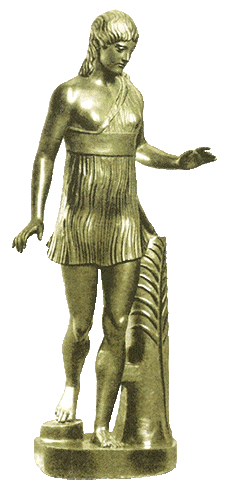 |
The charter expressly forbade women come during the games at the Olympic Stadium. Violators of this prohibition were supposed to be thrown into the abyss from the cliff. Only one adult woman is allowed to enter the stadium, the priestess of the goddess Dimetra, for her in the stadium, in the most honorable place, a special marble throne was built. It was a purely male holiday in honor of the god Zeus. Women had their own Olympic Games, and the competitions were called herii, because it was a holiday in honor of the goddess Hera, the wife of Zeus. There was one sporting competition on the geriya, a stadia race, or rather a fifth of the stadia, so it is more of a religious holiday associated with rituals and initiation. | |||||||
 |
|
|||||||
Gymnasiums and palestras, athletes lived, rested, trained here. The gymnasium is a vast courtyard surrounded by columns, there are running tracks, platforms for throwing, wrestling, and fisticuffs. The main part of the gymnasium was a portico 219.5 m long and 11.3 m wide. It was here that the track was measured, exactly corresponding to the Olympic distance, equal to one classical stage. In the center of the courtyard there was a palestra - originally a place where athletes competed, practicing in combat techniques and wrestling, as well as for various exercises, ball games. There were also baths, rooms for relaxation and massage. Adjacent to the gymnasium were the premises where the athletes lived.
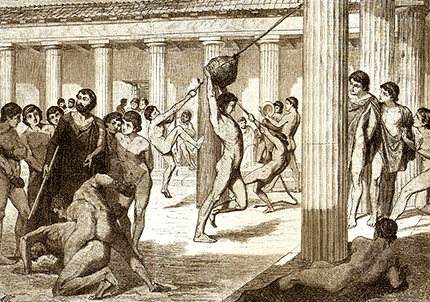 |
Gymnasium at Olympia |
|
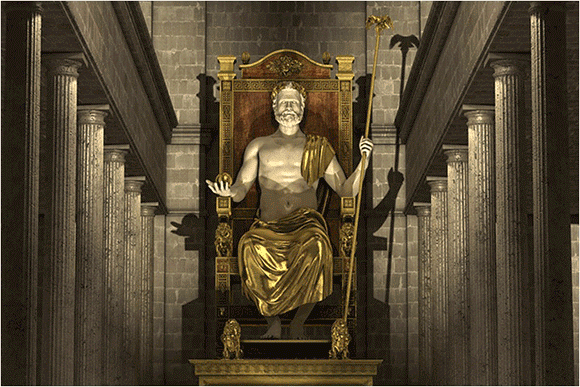 |
The games were held in honor of Olympian Zeus, whose temple was here, in Olympia. In the temple there was a statue of Zeus, sculpted by the sculptor Phidias from gold and Ivory. This statue was considered one of the seven wonders of the world. Here an oath was made to Zeus in honesty and fair play. The ancient Greeks believed in dozens of gods, but the Olympian Zeus was the greatest. It was in his power to strike lightning, he could embody the ideas of justice among people. A worthy god to whom you can devote your best efforts in Olympic competition. |
First Olympic Games. 40-45 thousand people gathered at the stadium, there were no comfortable seats, no one paid for tickets, everyone stood on the green slopes around the stadium, which is very modest by modern standards. The trumpet blew and the crowd of forty thousand listened with bated breath to the herald announcing the start of the race. He called the names of the athletes, asked the people. Can the persons named by him take part in the competitions, are there any violators of the sacred charter of the Olympic Games among them. If no one came up with an accusation against the participants in the competition, the athletes retired to a special building, where, throwing off their clothes, they rubbed their whole body with olive oil.
The place of start and finish was marked by stone strips separated by wooden poles at intervals of 1.2 meters. Between the pillars, two parallel grooves were cut in the stone, indicating a place for setting the feet of the runner. In Olympia, twenty athletes could start at the same time.

chronicle Olympic games exist, on the marble columns are the dates of all the games and the names of the winners. Let's pay tribute to the first champion, his name was Koroibos, an athlete from the city-polis of Elis. The Olympic Games were a living developing organism, new facilities were built, sports and cultural programs expanded.
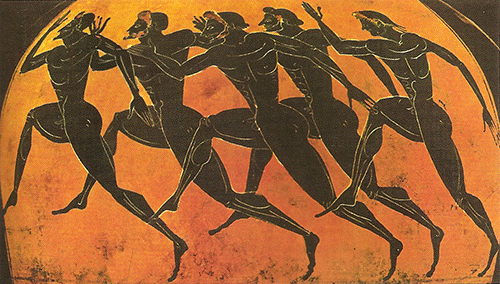 Greek run. Black-figure amphora. New York, Metropolitan Museum of Art |
This is what the chronology of the competitions that were introduced by the organizers of the games in Olympia looks like 1st Olympiad. 776 year. Stage running (192 m 27 cm) 14th Olympiad.724 year. Double run (diaulos - stage 2) 15th Olympiad. 720 year. Long run (dolichos - up to 24 stages) 18th Olympiad. 708 year. Pentathlon, wrestling. 23rd Olympiad. 688 year. Fist fight. 25th Olympiad. Quad racing. 33rd Olympiad. 648 year. Pankration, horse racing. 65th Olympiad. 520 Hoplitodrome (running with weapons). |
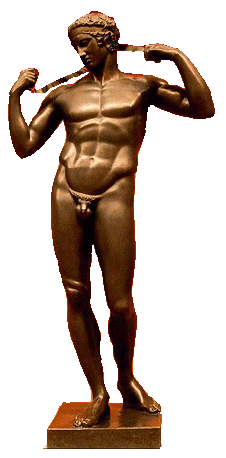 |
At the 18 Olympic Games (708 BC), for the first time in the history of the Olympiads, pentathlon (pentathlon) competitions were held, which included several sports: running, long jump, wrestling, javelin and discus throwing. If one person wins all three events, the pentathlon is over, if not, a tie is allowed for running and wrestling. For the ancient Greeks, pentathletes were a model of male beauty and strength. | 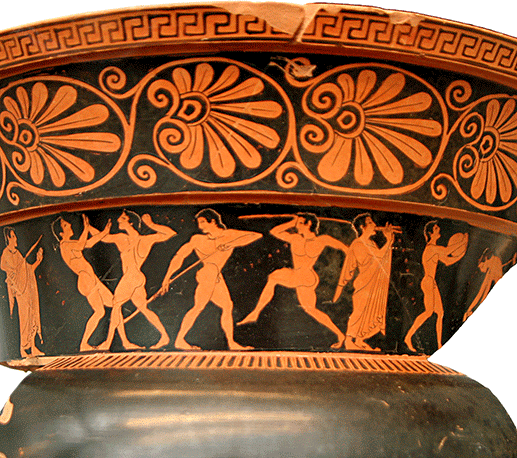 |
Long jump performed with the use of musical accompaniment (flute), which obliged the athlete to show the harmony and rhythm of movements. Long jumps were performed with a load (halters) in the hands. The weight of dumbbells reached from 1.6 to 4.6 kg. The result was largely determined by the activity of the dumbbell swing, first forward, and before landing, the athlete made an active movement of his arms back. This produced an additional effect on the body, which made it possible to increase the length of the flight.


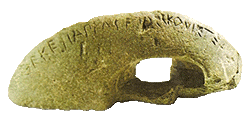
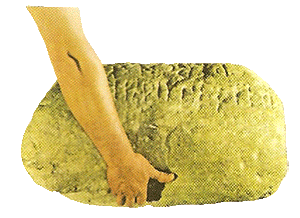
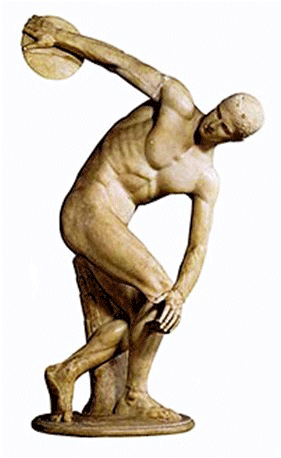 |
Discus and javelin throwing competitions were also performed to music. Discus throw. Having received a disc from the hands of the Hellanodic, the athlete stepped onto the balbis - a small elevation with a stone threshold, beyond which he was not allowed to step. He did not turn like modern throwers, he made several swings, using a lateral movement, when the plane of the disk was perpendicular to the ground, after which he threw the disk from the bottom up and forward, freezing with his arm outstretched. The shells were made of stone and bronze, weighing from 1.25 to 5.70 kg, with a diameter of 16 to 34 cm. |
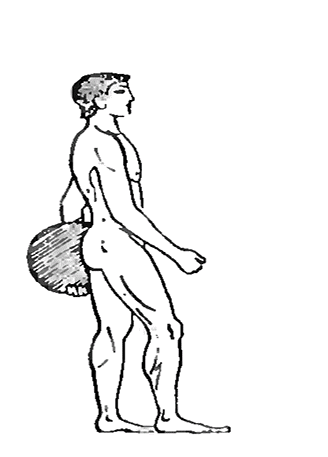 |
Javelin-throwing. main feature Greek spear - a leather loop in the middle of the shaft, which made it possible to give it rotation. With the help of a leather loop, they threw spears, increasing the strength of the throw. She was wrapped around a spear and two fingers, as a result, the spear received an additional push. Athletes apparently competed in two types of throwing - for accuracy at a special target and for distance.
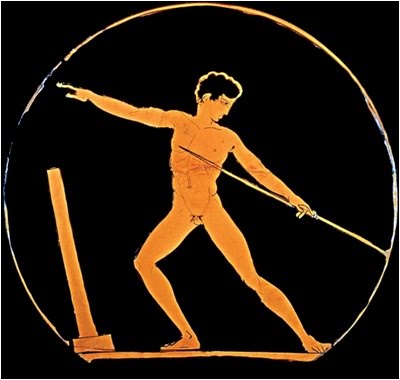
Struggle.During the wrestling matches, the athletes were not divided into weight categories, naturally the heavyweights had an advantage. The fight ended if one of the athletes touched the ground three times with his body. The fight, really, was a worthy crown of the pentathlon. If there were different winners in running, jumping and throwing, the undefeated in the wrestling was declared an Olympian. For the ancient Greeks, pentathletes were a model of male beauty and strength.
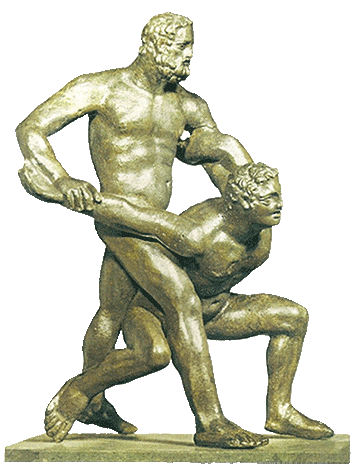 |
|
|
The Pythian Games are one of the four pan-Hellenic agons (games), which took second place after the Olympian and took place every four years in Delphi.
STORY
The history of the Pythian Games begins in 585 BC, when, after the end of the Holy War, the control of the Games passed to the Delphic Amphikitonia - the Council of the Twelve Greek Tribes. Since then, the Games have been held not every eight years, as it was before, but every four years, respectively, a year before the Olympic Games, apparently at the end of August.
The Pythian games were held in honor of Apollo, the god sunlight, the god of beauty and the patron of the arts, established, as it was believed, by the god himself in honor of the victory over Python. The games were held on August 15-19 in the third year of the Olympiads from 586 BC. The place of the contest is the plain at Delphi. Types of competitions: music, gymnastics, chariot races. As rewards, the winner was awarded an apple and a laurel wreath.
At the very beginning, only musical competitions were held in the Pythian Games. At first it was singing to the accompaniment of a cithara, later they added singing to the accompaniment of a flute and playing the flute separately. Unlike other major festivals, these disciplines have retained their great importance, although when the Pythian Games were updated, athletic competitions, chariot competitions and horseback riding appeared in them.
At the time of the Games, the sacred Peace was in effect, lasting three months. The truce guaranteed people - participants and spectators alike - a safe journey to the Games and back home. We have also heard references to the enthusiasm and delight with which the public received the participants in the competition. A large number of people flocked to Greece, this brought huge income to Delphi. The Agora (marketplace) became a significant trading place for artistic goods during the Games.
PROGRESS OF GAMES
The evidence of that time and the documents that tell about the Pythian Games of antiquity were destroyed by human violence or natural disasters. But all preserved sources emphasize the splendor and brilliance of the Games. The notes made by Aristotle give us an idea of the celebrations:
The games lasted from six to eight days and began with a sacred theatrical performance that represented the victory of Apollo over Python. During the solemn procession in the temple of Apollo, a great festive sacrifice was made. After the festive feast, the Games began on the fourth day.
Musical and theatrical competitions were held in the theater of the city of Delphi, and athletic competitions were held in the stadium of the city of Delphi. Due to the mountainous terrain of Delphi, chariot races were held on the plain near the city of Chris.
Art disciplines covered:
§ Hymn to the god Apollo
§ Playing the flute and cithara (ancient Greek stringed instrument) with and without singing
§ Competitions in theatrical and dance arts
§ Painting competition
The Pythian Games were games of honor. The winners received as a reward not cash prizes, but a laurel wreath. Just like the olive branch was an award in the Olympic Games. Apples must have sometimes also been given as prizes, and the winner in the Pythian Games received the symbolic palm branch in the same way as in the Olympic Games. When rendering special honors to the participant of the competition, a monument was erected in the form of a statue. However, the most priceless were the honor and respect that went to the winners and their hometowns. Therefore, the cities supported their representatives by all means, so that during the Games they achieved as much success as possible.
According to legend, the games were installed by Apollo himself in memory of the killing of the dragon Python by him, who lay down on the road to the sanctuary or lived on the site of a sanctuary that had not yet arisen. The historical reason for the establishment of the Pythian Games was the so-called "holy war" waged by members of the Delpho-Thermopylian amphiktyony, with Athens at the head, against the inhabitants of the city of Cyrrhus, who plowed up the sacred plots of the god (590 BC). However, apparently, in this case, the feast that had been celebrated since ancient times was only expanded.
Before the war, it took place in Delphi itself, under the supervision of the priests, every ninth year, and consisted only of a competition of cypharods who performed lean in honor of Apollo. In 590 before. AD to this was added a competition in playing the flutes and singing to their accompaniment, as well as gymnastic and equestrian competitions. The prizes were precious. From 582 BC Pythian games began to take place in every 3rd year of the Olympiad, in the month of Vukatio (August-September). Small pythonesses consulted every year. The festival was presided over by the Amphictyons; as a reward, the winner was given a wreath of laurel - a tree dedicated to Apollo. Musical contests at the Pythian games, in contrast to other agons, always constituted the main part of the holiday. Inscriptions found during excavations at Delphi by the French government have shed new light on the history of the Pythian Games. Among them, by the way, were several hymns to Apollo with ancient notation, which contributed to the enrichment of our knowledge of ancient music.
In their writings, these great competitions of antiquity were mentioned by Plutarch, Ovdias, Herodotus, Diodorus. Songs of praise in honor of the winners of the Pythian Games were also composed by the ancient Greek lyric poet Pindar. In addition, thanks to the inscriptions in honor of Aristotle and Callisthenes, we know that the regular Pythian games began in 582 BC. e. The Pythian Games were common Greek festivities and competitions at the temple of Apollo in Delphi, and were the second most important after the Olympic Games. According to legend, the Pythian games were established by Apollo after his victory over the serpent Python, and initially they consisted of musical competitions.
The principle of competition played a huge role in the life of Ancient Greece, it permeated all areas of activity of the Greeks: political life and war, trade and sports, art and religion. Of particular importance were the all-Hellenic holidays, which contributed to the fact that the Greeks, politically fragmented and scattered around the world, realized themselves as a single people with a single Hellenic culture. By the VI century BC. e. generally recognized, having a truly international authority, the Great Sacred Games of Greece were four holidays: the Pythian, Olympic Isthmian and Nemean games. Them hallmarks were, firstly, a pan-Greek character; secondly, special awards for the winners - wreaths from the branches of symbolic plants. Wreaths were considered a particularly honorary award in Greece.
The Pythian games did not go back to one ancient local custom, but were a pan-Hellenic holiday from the very beginning, created on the basis of several customs and combining arts with athletic competitions in its program. The establishment of this holiday was another stage in the development of the culture of the ancient Greeks. The successful alliance of the competitive nature of the Games and the spirit of unity helped the competition to revive after millennia, because this Higher forum of the arts is irreplaceable and unique in its kind.
In 394 AD e. Roman emperor Theodosius I banned the Pythian Games as pagan. In 1927 and in 1930. Two Delphic festivals were held in Greece, but the idea of reviving the Pythian Games ran into resistance from the Greek authorities.
The biography of the Greek philosopher Plutarch describes a historical plot involving Queen Parisatis, who passionately loved gambling with dice. The history of entertainment spans several millennia since its inception. ancient civilization Greece.
There are many different stories about when the tradition of holding the Olympics began. According to the first legend, it originated in 776 BC, this year is burned on a marble stone discovered during excavations by historians in Greece. The name of the winner in the running competitions at the Olympiad is carved on it - a cook by profession Koroibosara.
According to another legend, the holding of the Olympics is associated with the personality of Hercules. In 1253 BC The Greek king Avgiy ordered Hercules to clean the royal stables that had not been cleaned for a long time. He gave him little time for such work, only one day. was strong and therefore it was not difficult for him to change the direction of the river. He ran the water through the stable and got the job done quickly, as promised. The king refused to give the promised horses to Hercules. In response, the strongman dealt with the entire royal family. In honor of this event, he arranged a competition dedicated to Zeus. According to the myths of Greece, this day was the beginning of the traditional Olympics.
Also, according to tradition, it is obligatory to perform a sacrifice on the first day to Zeus, and then to other religious cults. People believed that they would help them in all endeavors and provide protection.

The first records of the holding gambling in ancient civilization meet 3500 BC Archaeologists have found many stone tablets depicting people and religious symbols. Games are mentioned in the myths of ancient Greece. According to one story, Zeus played with the titans - the brothers Poseidon and Hades. Bets were made on the possession of the Universe. Lots were cast and the owner of the worlds was determined. Zeus eventually got the heavenly Olympus, Poseidon became the ruler sea depths, and Hades became the patron of the Kingdom of the Dead. Another legend tells that Greek soldiers played dice during the siege of ancient Troy.
The winner in such competitions was determined by the judges. The program included wrestling and running, discus throwing, fistfights and chariot races. Anyone took part, but only they were included in special lists and the preparation was also carried out separately. Everyone who wanted to train for two, three months.
The winner is the one who from start to finish will come first in any category of programs. The winners were honored and treated with respect, and an olive branch was intended as a gift. The winner was given the right to erect his own statue, and his name was traditionally carved on a marble stele. He received nationwide fame, since victory in the stadium was an indicator of prestige. After each type of discipline, the names of winners and losers were announced.
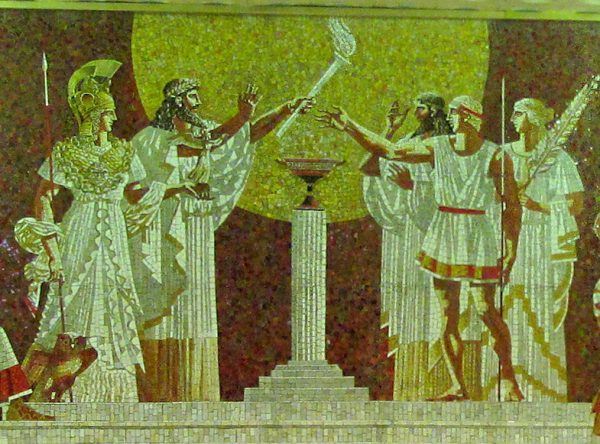
Women were not allowed to play, they could neither watch nor even participate in the Olympics.
The victory at the Olympics was considered by the ancient Greeks as a sign from above, a symbol of favorable location.
Among the winners of the Olympiad, Leonidas from, who became the winner in the games at the standodrome, stood out. He got first place in equipment and running. But Leonidas is not the only finalist: Hermogenes of Xaif won the coveted victory in ten different disciplines, in particular, in running. The record was given to Leonidas, who received twelve olive branches.
Now in the twenty-first century one can feel the full responsibility and richness of the life of the inhabitants. You can take part in the battle for Greece by participating in the following games:
Ancient Greece Games
The presentation was prepared by a 3rd grade student Danil Balykov
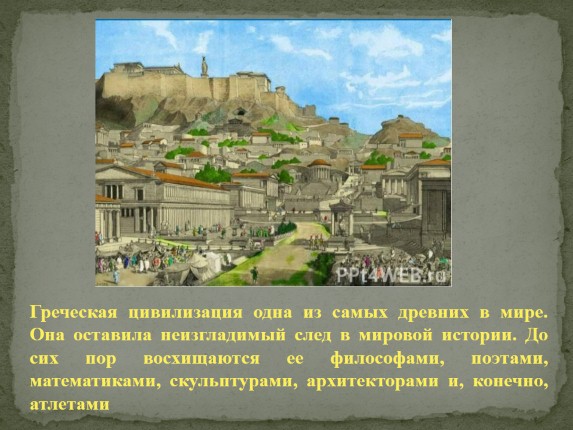
Greek civilization is one of the most ancient in the world. She left an indelible mark on world history. It is still admired by its philosophers, poets, mathematicians, sculptures, architects and, of course, athletes.
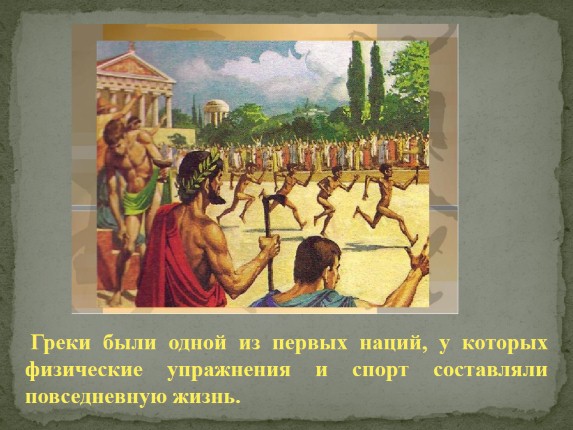
The Greeks were one of the first nations to have exercise and sports as part of their daily lives.
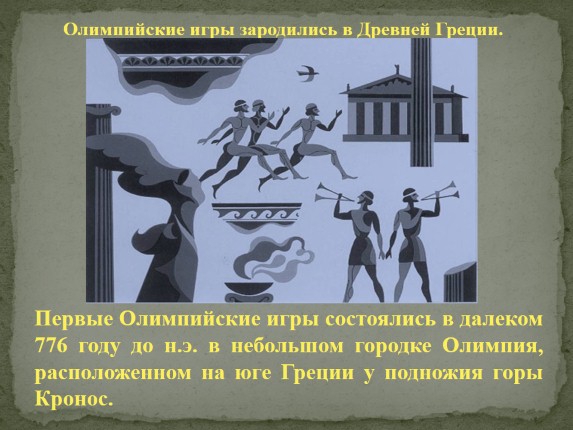
The first Olympic Games took place back in 776 BC. in the small town of Olympia, located in southern Greece at the foot of Mount Kronos.
The Olympic Games originated in Ancient Greece.
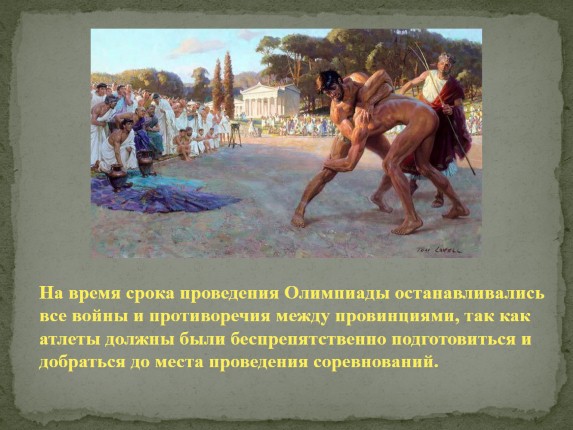
For the duration of the Olympics, all wars and contradictions between the provinces were stopped, since the athletes had to prepare freely and get to the venue of the competition.
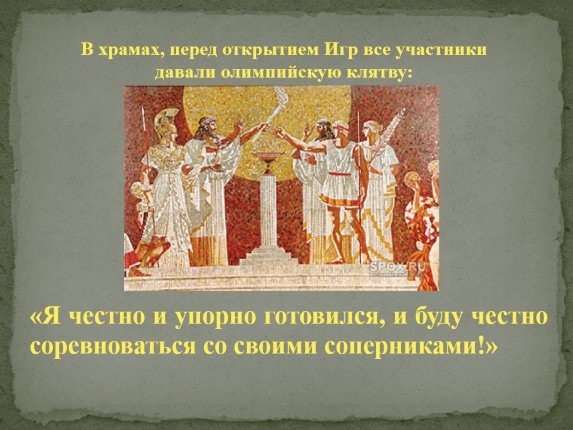
In temples, before the opening of the Games, all participants took the Olympic oath:
“I prepared honestly and hard, and I will compete honestly with my rivals!”

At first, the festival lasted one day, later - 5 days. However, there were times when the celebrations dragged on for a whole month.
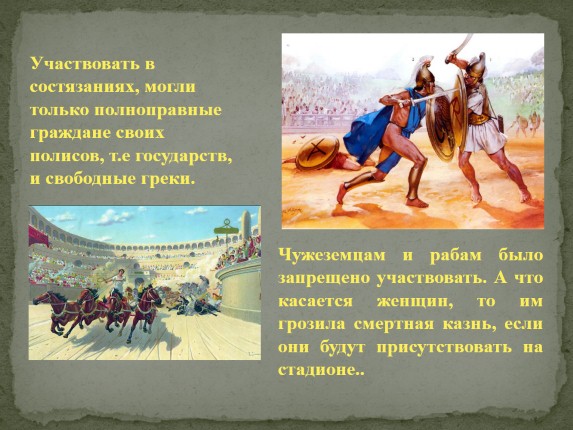
Foreigners and slaves were forbidden to participate. As for women, they faced the death penalty if they were present at the stadium ..
Only full-fledged citizens of their policies, i.e. states, and free Greeks could participate in the competitions.
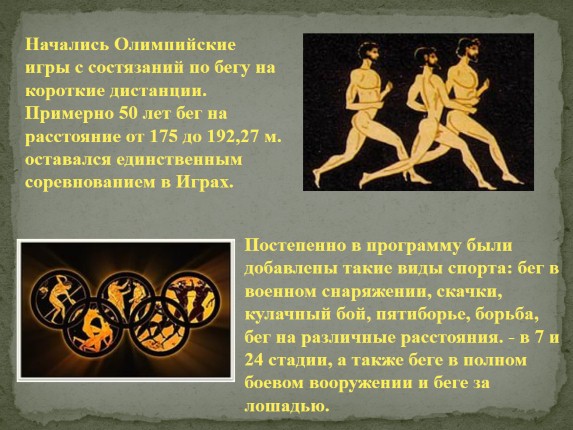
Gradually, the following sports were added to the program: running in military equipment, horse racing, fisticuffs, pentathlon, wrestling, running at various distances. - in stages 7 and 24, as well as running in full combat weapons and run after the horse.
The Olympic Games began with sprint competitions. For about 50 years, running from 175 to 192.27 meters remained the only competition in the Games.
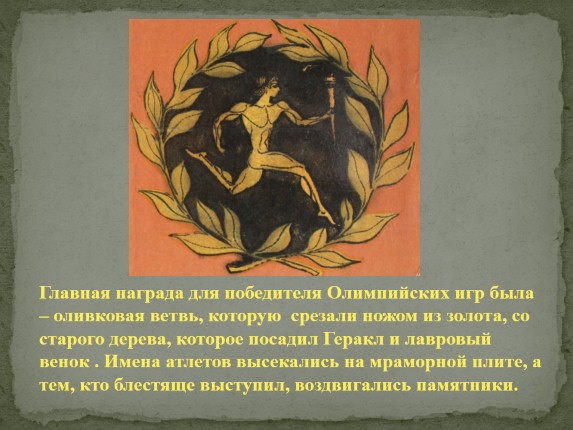
The main reward for the winner of the Olympic Games was an olive branch, which was cut with a knife made of gold, from an old tree planted by Hercules and a laurel wreath. The names of the athletes were carved on a marble slab, and monuments were erected to those who performed brilliantly.

The Olympic Games were held continuously for 1169 years 292 times. In 394 AD Roman emperor Theodosius I issued a decree restricting some pagan rituals in the territory of the Empire. This was the reason for the closure of the Olympic Games.

After that, they became interested in the Ancient Games only when the excavations of Olympia began. The finds, one more surprising than the other, amazed! Increasingly, voices began to be heard for the revival of the great competitions.

Revival of the Olympic Games
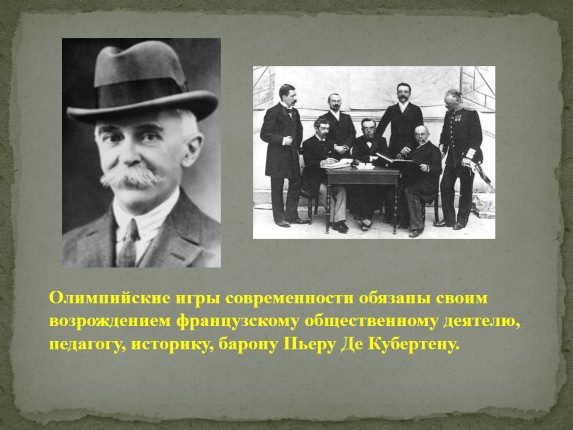
The modern Olympic Games owe their revival to the French public figure, teacher, historian, Baron Pierre de Coubertin.
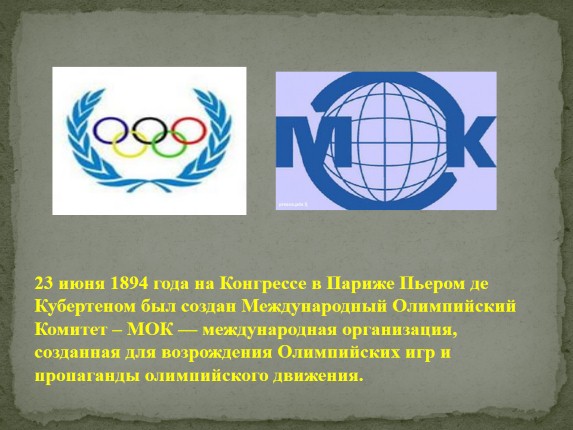
On June 23, 1894, at the Congress in Paris, Pierre de Coubertin created the International Olympic Committee - IOC - an international organization created to revive the Olympic Games and promote the Olympic movement.

The first modern games
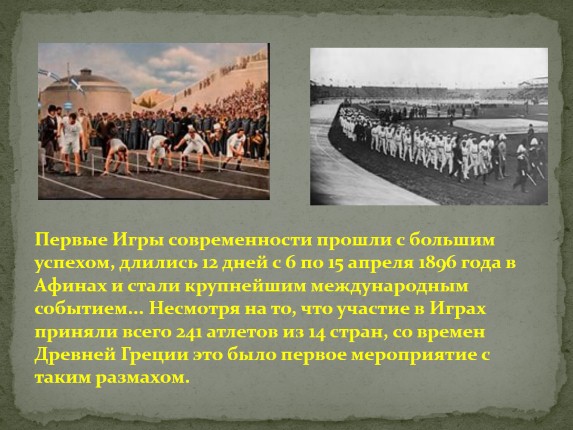
The first modern Games were held with great success, lasted 12 days from April 6 to April 15, 1896 in Athens and became the largest international event ... Despite the fact that only 241 athletes from 14 countries took part in the Games, since ancient Greece it has been the first event of this magnitude.

The traditional attributes of the Olympic Games are the Olympic emblem, the Olympic flame, the Olympic oath, the flag, the talisman. Traditional moments include the opening and closing ceremonies of the Olympic Games, the awarding of winners.
Olympic symbols
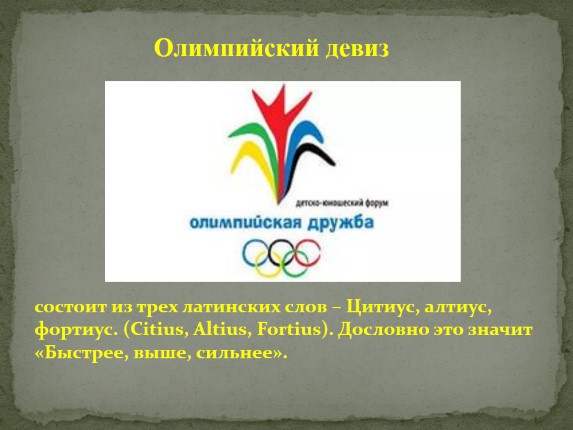
consists of three Latin words - Citius, Altius, Fortius. (Citius, Altius, Fortius). Literally, it means "faster, higher, stronger."
Olympic motto